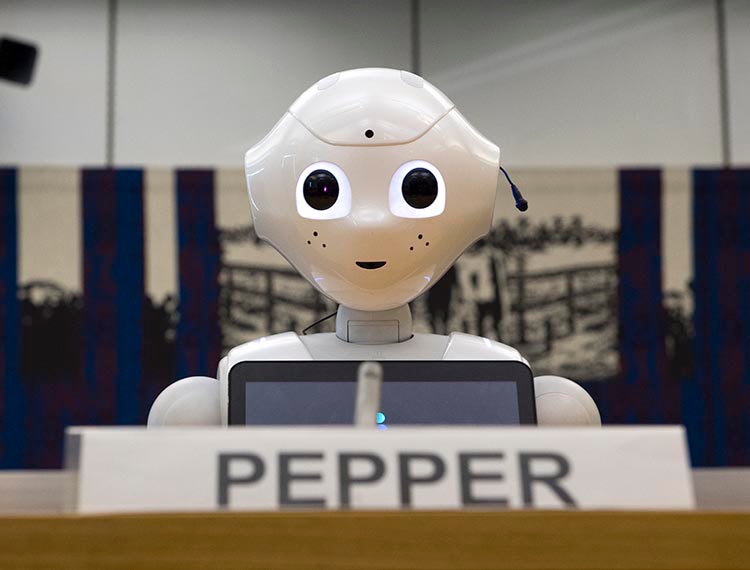Why Middlesex University took a robot to Parliament to demonstrate the #FutureofEducation

Middlesex University’s resident Pepper robot made history on 16th October 2018 by becoming the first robot to give evidence to a Parliamentary Select Committee hearing.
Pepper addressed the Education Committee during a session on the Fourth Industrial Revolution and the implications for education of developments in artificial intelligence.
Flanking Middlesex’s Executive Dean of Science and Technology, Professor Martin Loomes, Babak Jahanbani, General Manager at world-leading technical education equipment and solution provider Festo Didactic, and two Middlesex students, it described its role at Middlesex and how robots and human workers will complement each other in the workplace of the future.
Pepper’s visit came about after the Committee chair, Rob Halfon MP, visited Middlesex in summer 2018 and was so impressed with the science and engineering students and staff he met, he wanted to showcase their work.
Middlesex’s human witnesses described how Pepper is deployed by Middlesex at outreach science and tech events as a way to fascinate and charm visitors, particularly young children.
They outlined its potential in the classroom, for example to assist in teaching simple maths through movement and games; one of the panel members, robotics student Joana Da Cunha Miranda is currently working on a project using Pepper to teach numeracy skills to children with special needs or learning difficulties.i
Pepper is tactile, with sensory feedback through its facial recognition technology – eyes going from pink to green when it identifies a face – and programmed sequences of movement, which include human-like small shifts of the head and arms when at rest.
People are drawn to interact with it as a dynamic object, building a rapport and reinforcing their learning.
For students programming Pepper, the robot embodies the modern concept of computing, where a computer doesn’t automatically come with a keyboard and a screen but is in tools and everyday objects: “your driverless car, your fridge, your shopping system, Google, your phone, your camera” as Professor Martin Loomes explained to the Committee.
There is a huge range of potential applications of the technology currently being researched, in fields such as elder care, which the evidence session also touched on.
There was great media interest in Pepper’s appearance at the committee, with five national newspapers sending sketch-writers to cover the session and multiple broadcasters wanting to put Pepper on camera to ask it questions and show off its humanoid capabilities.
There was a misapprehension, as some tech commentators pointed out, that Pepper is self-aware and able to spontaneously communicate.
Some of the pre-programmed answers Pepper gave and the evidence presented by Middlesex’s human witnesses made clear that Pepper is now and for the foreseeable future an assistive tool rather than a replacement for human workers and interaction – hopefully putting fears about an imminent takeover by AI into context.
Computer Science student Nick Fitton told the Committee about his experiences studying at Middlesex and the University’s learning-by-doing philosophy. “I’ve been taught to be as diverse and adaptive as I can be”, he said. “In my first year, we learned about the fundamentals of web development, but they expect you to be able to roam into wider territories,” he added – so that when he was introduced to a blockchain project on an internship, he swiftly figured it out even though he hadn’t studied blockchain before, because that was the approach to new challenges Middlesex had prepared him for.
“With technology, we never know what’s going to come. In my course, it’s a lot of autonomy… we know we have the skill to go and explore [and] solve the situation” said Joana Miranda, who programmes and maintains Pepper, and presents the robot to visitors at science events.
She and Nick also see part of their role as breaking down stereotypes about engineering and science subjects, proving to young people through engagement events and publicity opportunities that these fields are for everyone, not just “blokes in a dark room”.
With Pepper in the classroom, “there’s a whole rich atmosphere of what we could do” Professor Loomes told the MPs.
In the spirit of Pepper’s versatility and synthesis of high-technology with psychological principles, he argues for a radical shift in the school curriculum, towards a model based around problem-solving rather than knowledge acquisition, that promotes interdisciplinary study and that embraces the idea of life-long learning.
As a University, Middlesex is committed to developing teaching methods that equip students for their working lives.
Middlesex academics are continually developing ways of thinking which reflect the fusing of technologies, such as Building Information Modelling Management programmes that bring together elements of engineering, construction, management and smart environments in ways not previously considered.
Babak Jahanbani, head of learning systems for Festo Didactic, which built the UK’s first smart factory training facility at Middlesex, told the MPs the teaching ethos at Middlesex is “quite gratifying”.
He has recruited two Middlesex graduates and declared that “these guys have been quite massive, they’ve taken our business to a different level. Not just on a technological side but also a business-minded approach to customers”.
by Franca Tranza, Senior PR Officer and Joshua Neicho, PR Officer, Middlesex University











Responses